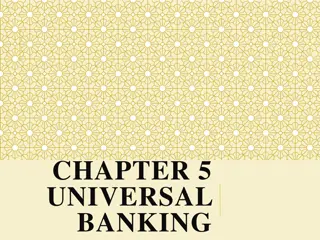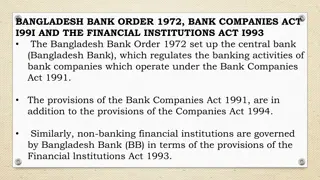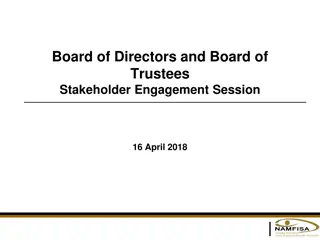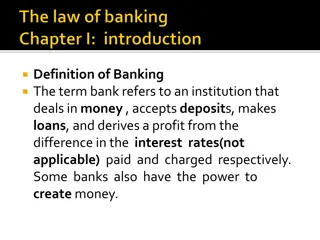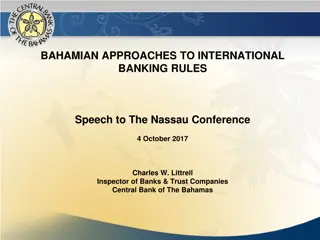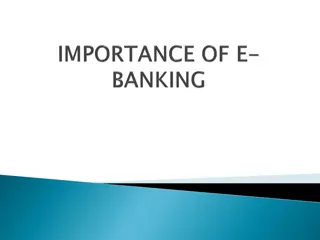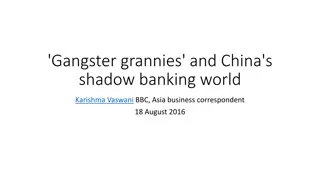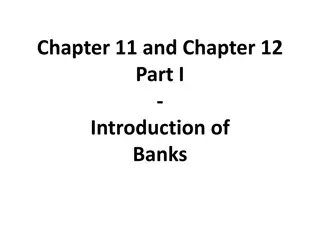Understanding Prudential Regulations in Banking
Prudential regulations in banking are essential to reduce risks for creditors and protect depositors. The State Bank of Pakistan issues regulations covering risk management, corporate governance, anti-money laundering, and more to ensure the safety and soundness of the financial system.
Download Presentation

Please find below an Image/Link to download the presentation.
The content on the website is provided AS IS for your information and personal use only. It may not be sold, licensed, or shared on other websites without obtaining consent from the author. Download presentation by click this link. If you encounter any issues during the download, it is possible that the publisher has removed the file from their server.
E N D
Presentation Transcript
IN The Name of Allah THE MOST BENEFICENT AND THE MOST MERCIFULL
PRRUDENTIAL REGULATIONS Prudential to reduce the level of risk bank creditors are exposed to (that is, to protect depositors) Regulations which are governed by laws. Prudential Regulations are issued by State Bank of Pakistan to put in place a prudent regulatory framework for ensuring safety and soundness of the financial system besides protecting the interests of users of financial services.
PRUDENTIAL REGULATIONS The Prudential Regulations for Corporate/Commercial Banking cover four categories viz. Risk Management (R), Corporate Governance (G), Customer Due Diligence and Anti Money Laundering (M), and Operations (O). The Prudential Regulations for Corporate/Commercial Banking do not supersede other directives issued by State Bank of Pakistan in respect of areas not covered here. Any violation or circumvention of these regulations shall render the bank/DFI/officer(s) concerned liable for penalties under the Banking Companies Ordinance, 1962.
REGULATION R-1 LIMIT ON EXPOSURE TO A SINGLE PERSON/GROUP Outstanding exposure (fund based and non-fund based) to any single person shall not at any point in time exceed 30% of the bank s/DFI s equity, subject to the condition that the maximum outstanding against fund based exposure does not exceed 20% of the bank s/DFI s equity. Outstanding exposure to any group shall not exceed 50% of the bank s/DFI s equity subject to the condition that the maximum outstanding against fund based exposure does not exceed 35% of the bank s/DFI s equity. The group will cover both corporate entities as well as SME s, in cases where such entities are owned by the same group.
REGULATION R-2 LIMIT ON EXPOSURE AGAINST CONTINGENT LIABILITIES Contingent liabilities shall not exceed at any point in time 10 times of Bank s equity. Following shall not constitute contingent liabilities: 1. Bills for collection 2. Obligations under Letters of Credit and Letters of Guarantee. 3. Letters of credit/guarantee at least A by a credit rating agency. 4. Non-fund based exposure to the extent covered by liquid assets. 5. Claims other than those related to provision of facilities. weight advance/performance bonds and 10% to forward foreign exchange contracts. age of 50% shall be given to bid/mobilization
REGULATION R-7 GUARANTEES Guarantees shall be fully secured, except in the cases mentioned at Annexure-III where it may be waived up to 50% , provided that banks/DFIs hold at least 20% of the amount in the form of liquid assets as security. The requirement of security can also be waived in cases of guarantees issued to Pakistani firms and companies functioning in Pakistan against the back to back/counter guarantees of branches of guarantee issuing bank/DFI or banks/DFIs rated at least A or equivalent by a credit rating agency. In case of back to back letter of credit for export oriented goods and services, banks/DFIs are free to decide the security arrangements at their own discretion. The guarantees shall be for a specific amount and expiry date and shall contain claim lodgment date. (banks/DFIs are allowed to issue open ended guarantees)
REGULATION R-10 FACILITIES TO PRIVATE LIMITED COMPANY Banks/DFIs shall formulate a policy, duly approved by their Board of Directors, about obtaining personal guarantees of directors of private limited companies. Banks/DFIs may, at their discretion.
REGULATION M-1 CUSTOMER DUE DILIGENCE (CDD) It is expedient to prevent the possible use of the banking sector for money laundering and terrorist financing. Customer Due Diligence/Know Your Customer (CDD/KYC)requires special attention. The following minimum guidelines are required to be followed by banks/DFIs: Banks/DFIs shall formulate and put in place, a comprehensive CDD/KYC policy duly approved by their Board of Directors or by their head office and cascade the same down the line to every business. Policy shall include a description of the types of customers that are likely to pose a higher than average risk and guidelines for conducting Enhanced Customer Due Diligence depending upon the customers.
(CONTINUED M-1) Banks/DFIs should not open and maintain anonymous accounts or accounts in the name of fictitious persons. All reasonable efforts shall be made to determine identity of every prospective customer. copies of CNIC wherever required are invariably verified, before opening the account, from NADRA through utilizing online facility. the identity of the beneficial owner is verified using reliable information/ satisfactory sources. the cost of verification of CNIC from NADRA should not be passed on to their account holder(s)








